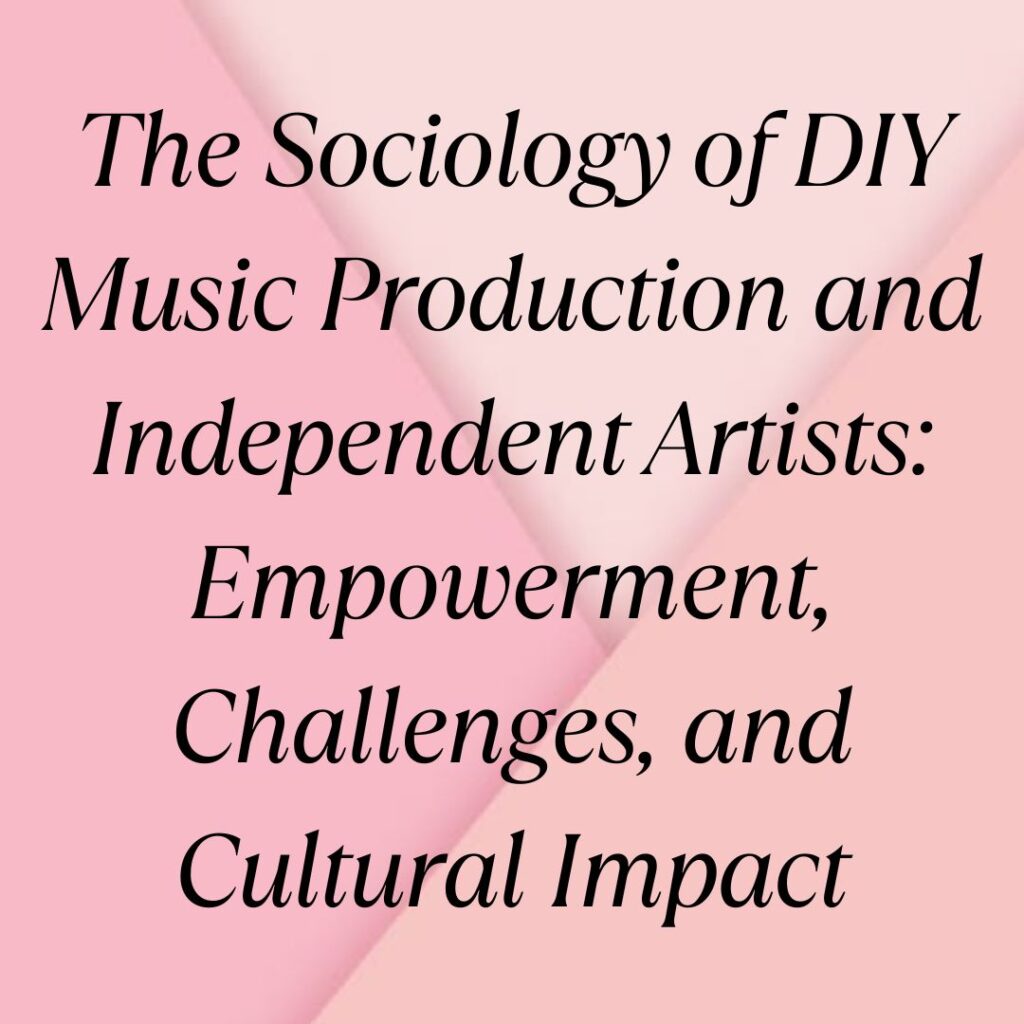In the ever-evolving landscape of the music industry, a quiet revolution has been underway for decades, quietly gathering momentum and reshaping the way we create, consume, and think about music. This revolution is the rise of DIY music production and the flourishing community of independent artists who are challenging the traditional norms of the industry.
The Rise of DIY Music Production
DIY (Do It Yourself) music production refers to the practice of creating music independently without the backing of major record labels or significant financial resources. What was once a niche pursuit confined to basements and makeshift home studios has now become a widespread phenomenon, facilitated by advancements in technology and the democratization of music-making tools.
Technological Empowerment
The advent of affordable recording software, digital audio workstations (DAWs) like Ableton Live and Logic Pro, and high-quality home recording equipment has empowered musicians to produce professional-grade music from the comfort of their own spaces. This technological democratization has leveled the playing field, allowing artists to bypass the traditional gatekeepers of the industry and retain creative control over their work.
Take, for example, Billie Eilish and her brother Finneas O’Connell, who famously recorded Eilish’s breakout album “When We All Fall Asleep, Where Do We Go?” in their bedroom studio. This Grammy-winning album not only showcased their artistic talent but also demonstrated the potential of DIY production to achieve mainstream success.
Economic Realities
Beyond creative freedom, DIY music production offers economic advantages to independent artists. By eliminating the need for expensive studio time and minimizing overhead costs, musicians can operate more sustainably and retain a larger share of their earnings from streaming platforms and merchandise sales. This financial independence allows artists to reinvest in their careers, fund tours, and connect directly with their fan base.
Challenges Faced by Independent Artists
However, the path to success in DIY music production is not without its challenges. Without the marketing muscle and industry connections of major labels, independent artists must navigate a crowded digital marketplace and work tirelessly to build their audience from the ground up.
Visibility and Promotion
Standing out amidst millions of songs uploaded daily to streaming platforms requires savvy marketing strategies and a strong personal brand. Social media platforms like Instagram, TikTok, and YouTube have become essential tools for self-promotion, enabling artists to engage directly with fans, share behind-the-scenes content, and cultivate a loyal following.
Financial Sustainability
While DIY production reduces upfront costs, sustaining a music career independently can be financially precarious. Many artists rely on a patchwork of income streams, including streaming royalties, live performances, merchandise sales, and crowdfunding campaigns, to make ends meet. The volatile nature of these revenue sources requires careful financial planning and a willingness to adapt to changing market conditions.
Cultural Impact and Community Building
Beyond its economic implications, DIY music production has had a profound cultural impact by fostering a sense of community and inclusivity within the music industry. Independent artists often collaborate with like-minded creators, share resources, and champion diversity in their artistic expressions.
Diversity of Voices
The DIY ethos has opened doors for artists from underrepresented backgrounds to share their stories and challenge mainstream narratives. Genres such as queercore, riot grrrl, and Afrofuturism have flourished within the independent music scene, offering platforms for marginalized voices to be heard and celebrated.
Global Reach
The internet has played a pivotal role in connecting DIY artists with global audiences, transcending geographical boundaries and cultural barriers. Platforms like Bandcamp, SoundCloud, and Spotify enable musicians to distribute their music worldwide, fostering cross-cultural exchanges and introducing listeners to new and innovative sounds.
Relevance to the Current Times
In an era defined by rapid technological advancement and shifting consumer behaviors, the DIY ethos resonates deeply with contemporary audiences seeking authenticity, transparency, and meaningful connections with creators. The COVID-19 pandemic further underscored the resilience of DIY musicians, who adapted to lockdowns and social distancing measures by live-streaming concerts, hosting virtual album releases, and finding new ways to engage with their fan base remotely.
The Future of DIY Music Production
Looking ahead, the future of DIY music production appears promising yet challenging. As streaming algorithms and digital platforms continue to evolve, independent artists will need to innovate and adapt to remain competitive. The rise of blockchain technology and decentralized finance (DeFi) presents new opportunities for artists to monetize their work directly and transparently, bypassing traditional intermediaries.
Conclusion
In conclusion, the sociology of DIY music production and independent artists represents a paradigm shift in the music industry, empowering creators to reclaim their artistic autonomy and redefine success on their own terms. While challenges persist, the DIY ethos continues to inspire innovation, foster community, and celebrate the diverse voices shaping the cultural landscape of today and tomorrow.
As we navigate an increasingly interconnected world, the stories and sounds emerging from DIY studios around the globe remind us of the transformative power of music to transcend boundaries, challenge conventions, and unite us in shared experiences. Whether you’re an aspiring musician, a dedicated fan, or simply curious about the evolution of creativity in the digital age, the DIY movement offers a compelling glimpse into the future of music and the enduring spirit of artistic independence.
So, next time you press play on a track from your favorite independent artist, remember the journey behind the music—a journey fueled by passion, perseverance, and a belief in the transformative power of DIY creativity.






